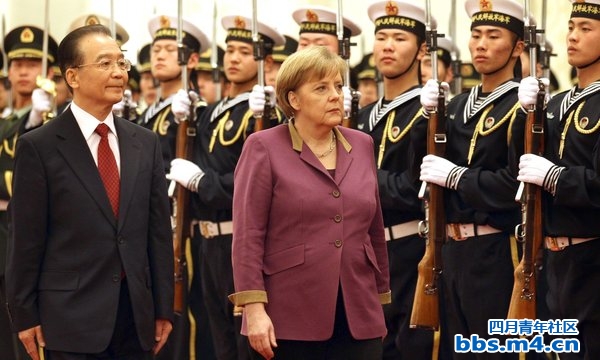本帖最后由 lilyma06 于 2012-2-3 10:22 编辑
http://www.nytimes.com/2012/02/03/business/global/china-considers-offering-aid-in-europes-debt-crisis.html?_r=1

Prime Minister Wen Jiabao, left, with Chancellor Angela Merkel of Germany, who is on a three-day visit to China.
HONG KONG — Prime Minister Wen Jiabao said Thursday that China would consider working with the International Monetary Fund to help shore up Europe’s finances. But he left unclear whether China was willing to drop conditions that so far have made its proposed help unappealing to European nations.
Mr. Wen’s comments came at a Beijing news conference after he met with Chancellor Angela Merkel of Germany on the first day of her three-day visit to China.
Mrs. Merkel is the first of several European leaders scheduled to visit China this month, as China’s huge holdings of foreign exchange reserves have begun to give it financial influence that could potentially rival Washington’s.
Mr. Wen said that Chinese officials were studying whether the country should be “involving itself more” in helping Europe solve its debt troubles by investing in the region’s two big rescue packages: the existing European Financial Stability Facility and the planned European Stability Mechanism. China’s contributions could be channeled through the I.M.F., he said.
Lending money to the I.M.F. to, in turn, relend to Europe would effectively transfer more of the risk of any European debt default to the I.M.F. China has previously made clear that it would need to buffer the risk of lending more money to Europe.
In December Russia embraced the lending approach now being weighed by China, but Moscow was willing to lend the I.M.F. only $20 billion. Europe is trying to expand its bailout funds by hundreds of billions of dollars.
Britain has also said it would consider sending more money to the I.M.F. to help with Europe’s troubles — but only after the Europeans demonstrated they were finally taking bold steps to stem the contagion.
China had $3.18 trillion in foreign exchange reserves at the end of December, dwarfing the reserves of every other country and potentially giving it the financial firepower to make a significant contribution.
Having Chinese money on the table could help restore the international investing community’s confidence in Europe. It would also signal that the Chinese believe Mrs. Merkel and other European leaders have taken the necessary steps to begin solving Europe’s sovereign debt crisis.
One big question, though, is what kind of political or trade concessions China might want in exchange for assistance.
When Mr. Wen suggested last September that the European Union could dismantle its legal protections against low-price Chinese exports, the idea was immediately condemned by European trade officials.
An opinion article Thursday in the official China Daily newspaper raised Mr. Wen’s trade condition again and suggested that the European Union should also make political concessions — like lifting a longstanding ban on arms exports to China. “As a Chinese saying goes, one does not visit the temple for nothing,” the column warned.
Christine Lagarde, the I.M.F.’s managing director, has been playing a prominent role in trying to broker an agreement that will satisfy creditor nations like Germany and debtor nations like Greece at the same time. That includes a possible plan to convert the temporary, 440-billion euro ($577 billion) European Financial Stability Facility into a permanent, 500-billion euro ($655 billion) European Stability Mechanism.
European officials have been approaching China intermittently for two years. The aim is to persuade the Chinese government to increase the approximately one-quarter of its foreign exchange reserves that are thought to be held now in euros, mostly in government bonds issued by the financially strongest countries in Europe — and to get Beijing to diversify that lending by buying the bonds of other, more troubled nations in the euro currency union.
Economists and officials with a detailed knowledge of China’s position have said repeatedly that China would be willing to help, but only if its loans could be made essentially risk-free. One way to do this would be for the European nations jointly to agree to repay the loans even if some nations defaulted. But Germany has been wary of any arrangement that could make it the guarantor of other European nations’ liabilities, and there has been little sign that German thinking on this has changed.
Another way to address China’s concerns about risk would be for the I.M.F. to assume the liability.
Chinese officials indicated in November and early December that they were leery of helping Europe, noting publicly that the country’s foreign exchange reserves had been financed with money borrowed from the Chinese people. Beijing suggested that it might be safer to invest it in infrastructure projects overseas instead of government bonds.
But since then, the sense of crisis in Europe has diminished somewhat. That is largely because the European Central Bank in mid-December began extending large three-year loans to European commercial banks at extremely low interest rates, damping concerns of a Lehman Brothers-style liquidity crisis breaking out.
Europe’s troubles are far from over, however. The euro region’s economy is expected to languish in recession for most of this year. Greece has also been struggling to raise the money for bond payments due next month in order to avoid a default. So the financial negotiations to stabilize Europe remain urgent.
A clear priority for Beijing has been to prevent a slump in the value of the euro against China’s currency, the renminbi. Such a slump, by increasing the renminbi’s relative value, would make Chinese goods less competitive in Europe, China’s largest export market.
“China supports Europe in safeguarding the stability of the euro,” Mr. Wen said at the news conference, alongside Mrs. Merkel.
Germany has joined the United States in the past in supporting a stronger renminbi. But Mrs. Merkel was circumspect on the subject Thursday, saying only that she supported the Chinese goal of working together to make the renminbi more convertible on global currency markets.
Keith Bradsher reported from Hong Kong and Liz Alderman from Paris.
|